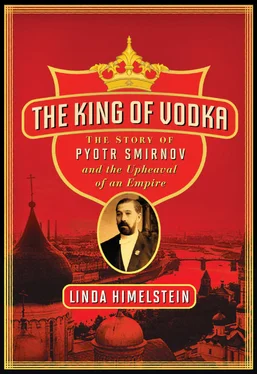Much like his adult years, Pyotr’s boyhood was dominated by three primary concerns: work, religion, and family. A seemingly incongruent hodgepodge of allegiances, these devotions were complimentary in practice, providing the foundation for Smirnov’s willingness—even eagerness—to do whatever was required of him, checked by an ever-bending conscience born out of rigid Christian orthodoxy.
Smirnov’s days, alongside his older brother, Yakov, were crammed with farm work, feeding the animals, hauling firewood, gardening, and cultivating the land. Serfs were required to tend their master’s fields—often using their own equipment—to provide for everyone who lived in the community. In Smirnov’s province, agriculture was dominated by flax, potato, rye, and wheat. The work was difficult, tedious, and long, particularly for a young child. Pyotr did as he was told, perhaps because he had no other choice.
Many serfs were viewed by their masters as “baptized property,” according to Aleksander Gertsen, a Russian social activist. Most masters made little distinction between the people who plowed their fields and the horses that pulled the plows. Like merchandise at the community market, they could be bought, sold, or presented as gifts, almost on a whim. Those who stepped out of line or didn’t pull their weight could find themselves shipped off to a new home or an entirely new town—sometimes without their families.
The Smirnovs did not have to worry about such penalties. Diligent workers who made no trouble pleased their owners. Unlike the stereotypical serfs, whom the nobility routinely dismissed as ignorant and uncultured, Pyotr’s family was industrious and opportunistic. When Pyotr and his siblings were not consumed by chores, they received rudimentary lessons in reading, writing, math, and religion from their parents. Since just 1 percent of serfs were literate at the time, even this superficial education set the family apart from the some 551,000 serfs living in their local province of Yaroslavl. It also made them more valuable. Literate serfs could fetch a purchase price of 300 rubles each compared to just 200 rubles for those who lacked basic reading skills. 12
Clearly, the Smirnovs’ owners, first the Skripitsyns and later the Demidovs, both descendants of wealthy aristocratic dynasties, appreciated their more capable serfs. The Smirnov’s home, though small, was likely larger than any other occupied by serfs in the village. Family members were also given more entrusted positions. Pyotr’s father, Arseniy, was handpicked by Nadezhda Stepanovna Skripitsyna out of dozens of serfs to represent her interests when land was distributed between members of the nobility. This responsibility made him a manager of sorts, someone who commanded a degree of respect and authority. Arseniy’s younger brother, Ivan, was a house serf. He was one of a handful of serfs permitted to work in the master’s lavish estate, to receive meals there, and to organize the affairs of the house. This role exempted Ivan from the hard manual labor others endured daily, though his job was not considered a particularly privileged one. House serfs did not get to share in the bounty of the land, had to live in small izbas behind or near the master’s home, and were viewed as even lower on the social ladder than ordinary serfs.
Still, life inside the master’s home was more than comfortable. A typical estate consisted of multiple buildings, including a palatial main residence full of lavish imported furnishings and a large two-floored, stone outhouse. These dwellings were often surrounded by wooden garagelike structures to house carriages, stone or wood stables for the horses, a greenhouse, a bowling alley, various sheds to hold hay and grains, and a special structure for summertime activities and entertainment.
The Smirnovs maintained amicable relations with their masters and made the best of their provincial circumstances. Village life could be pleasant—and stable. But it was hardly the most desirable situation, nor was it profitable. The soil, overrun with dense forests, swamps, and ravines, was not particularly fertile. Difficult agricultural conditions presented a tough hurdle for serfs who ached to earn enough money to buy their freedom. At that time, peasants could ransom themselves by paying their masters an agreed-upon sum. In the Smirnov’s region of Yaroslavl, the average price of freedom in the early nineteenth century was between 219 and 266 rubles, the equivalent of about $39 to $48 then. [4] The value of a ruble in 1821 was about twenty-one cents.
Though it was no more than the cost of about twenty horses 13, it was as far out of reach for the ordinary serf as a private conversation with the tsar. To narrow the gap, serfs often sought permission from their landowners to venture beyond their small surroundings and seek jobs in larger towns and cities. They could make considerably more money—as much as 100 rubles in one winter—that then would have to be divided with their masters. This seasonal migration, a relatively common practice, was primarily meant for men and their sons. Women and girls often remained behind to maintain the homestead and do the hard work necessary to create their dowries, which often included home-sown bed linens, towels, napkins, and tablecloths.
Naturally, the Smirnovs yearned for freedom. The first to go after it was Grigoriy, Pyotr’s uncle and one of his father’s younger brothers. Pyotr was still a toddler when his uncle packed up his meager belongings in 1835 and made for the twenty-five-mile dirt road that led from his village to the bustling town of Uglich. The walk was long and tedious, but Grigoriy would have kept himself occupied, meeting up with caravans heading here or there and stopping at the homes of acquaintances for rest and nourishment. Mostly, though, he probably thought about his future. At age twenty-six, Grigoriy had big plans.
GRIGORIY HAD CERTAINLY been to Uglich before. It was a busy trading stop for people en route to St. Petersburg, Moscow, and other important cities. Although the town had only nine thousand permanent inhabitants, its ranks swelled throughout the week as transients stopped to barter goods, purchase supplies, and rest. Grigoriy, enterprising and resourceful, figured that Uglich could improve its local economy if it gave visitors a good enough reason to hang around longer. The best way to do that, he surmised, was to offer comfortable accommodations, decent food, and plenty of liquor. And that’s what he told his master’s brother, Mikhail Skripitsyn.
Skripitsyn must have seen something special in Grigoriy. He wasted no time at all scribbling out the legal document required for a serf to travel and work away from home. Skripitsyn likely figured that if Grigoriy was as successful as he suspected he would be, a big payday would be in the offing. Grigoriy might have carried the letter, which attested to his integrity and moral character, inside the folds of his heavy coat. It would have rested against his breast like a priceless treasure map. When Grigoriy took it out to present to officials in Uglich, seeking permission to open his first inn, he did so with confidence. The document was dated December 10, 1835, and stated:
This certificate is provided by the landowner, the Titular Advisor and Cavalier Mikhail Stepanov Skripitsyn, to the peasant Grigoriy Alekseyevich Smirnov from the Yaroslavl province, who has been in my possession. The certificate gives him the right to run hotels and any such establishment in the town of Uglich. I know that his behavior is good and irreproachable and that he has not been involved in any suspicious activities. He has never been fined or sued and therefore can be permitted to engage in the mentioned hotel. I confirm this by my personal signature. 14
It was as if Grigoriy had been reborn. No longer just a village serf, he was now a “trading peasant, fourth class.” 15Though still a world away from the upper crust, his new status nonetheless gave him ample opportunity to make the acquaintance of one of Uglich’s most prominent families, the Zimins. They owned tanneries and linen factories, and produced supplies for Russia’s armies. More importantly, the family was into local real estate. Grigoriy leased a house from the Zimins. Its location in the center of town was perfect for the hotel and restaurant he planned to put there. The building was spacious and loaded with such modern conveniences as glass windows. 16Grigoriy transformed the property into a welcoming inn, restaurant, and drinking establishment. He had gained permission from local authorities to rent out rooms and serve a variety of food and beverages, including tea, hot chocolate, beer, and rum. He could also offer sweet drinks made with vodka. Homemade or counterfeit vodkas, as well as pure vodkas, were forbidden. No matter: Grigoriy, who took on the Smirnov name almost at random when he left his village, was peddling vodka for his own account—the first Smirnov to do so.
Читать дальше












